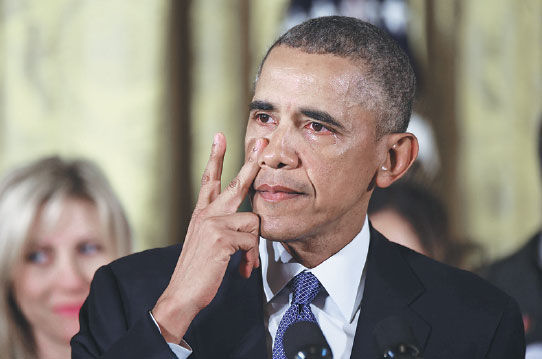An emotional Obama unveils plan to cut gun violence
Whether step can make a significant dent in unregulated sales is an open question
US President Barack Obama, with tears streaking his cheeks, launched a final-year push on Tuesday to tighten sales of firearms in the country, using his presidential powers in the absence of tougher gun restrictions that Congress has refused to pass.
The president struck a combative tone as he came out with plans for expanded background checks and other modest measures that have drawn criticism from gun rights groups, which Obama accused of making Congress their hostage.
|
US President Barack Obama wipes tears away as he delivers a statement on executive actions to reduce gun violence on Tuesday in Washington. Jim Watson / Agence France-Presse |
Palpable, too, was Obama's extreme frustration at having made such little progress on gun control since the killing of 20 elementary school children in Connecticut shocked the nation more than three years ago.
"First-graders," Obama said woefully, resting his chin on his hand and wiping away tears as he recalled the 2012 massacre at Sandy Hook Elementary School in Newtown, Connecticut. "Every time I think about those kids, it gets me mad."
Obama's 10-point plan to keep guns from those who shouldn't have them marked a concession by the president: He'll leave office without securing the new gun control laws he's repeatedly and desperately implored Congress to pass.
Although Obama, acting alone, can take action around the margins, only Congress can enact more sweeping changes that gun control advocates say are the only way to truly stem the frequency of mass shootings.
"It won't happen overnight," Obama said. "It won't happen during this Congress. It won't happen during my presidency." But, he added optimistically, "a lot of things don't happen overnight".
The National Rifle Association, the largest gun rights lobbying group, panned Obama's plan and said it was "ripe for abuse", although the group didn't specify what steps, if any, it will take to oppose or try to block it.
Centerpiece
The centerpiece of Obama's plan is an attempt to narrow the loophole that exempts gun sales from background checks if the seller isn't a federal registered dealer. With new federal "guidance", the administration is clarifying that even those who sell just a few weapons at gun shows, flea markets or online can be deemed dealers and required to conduct checks on prospective buyers.
Whether that step can make a significant dent in unregulated gun sales is an open question, and one not easily answered.
Millions of guns are sold annually in informal settings outside of gun shops, including many through private sales arranged online. But the Obama administration acknowledged it couldn't quantify how many gun sales would be newly subjected to background checks, nor how many currently unregistered gun sellers would have to obtain a license.
Easily reversible by a future president, the government's guidance to gun sellers lacks the impact of a new law, such as the one Obama and like-minded lawmakers tried but failed to pass in 2013 in the wake of the Sandy Hook massacre.
What's more, none of the steps would have probably prevented any of the recent mass shootings that Obama invoked in the East Room, including those in Aurora, Colorado, Charleston, South Carolina, and Newtown. Obama defiantly rejected that critique, dismissing it as the tired trope of gun lobbyists who question "why bother trying?"
"I reject that thinking," Obama said. "We maybe can't save everybody, but we could save some."
Hoping to give the issue a human face, the White House assembled a cross-section of US citizens affected by searing recent gun tragedies. Mark Barden, whose son was shot to death at Sandy Hook, introduced the president with a declaration that "we are better than this".



















